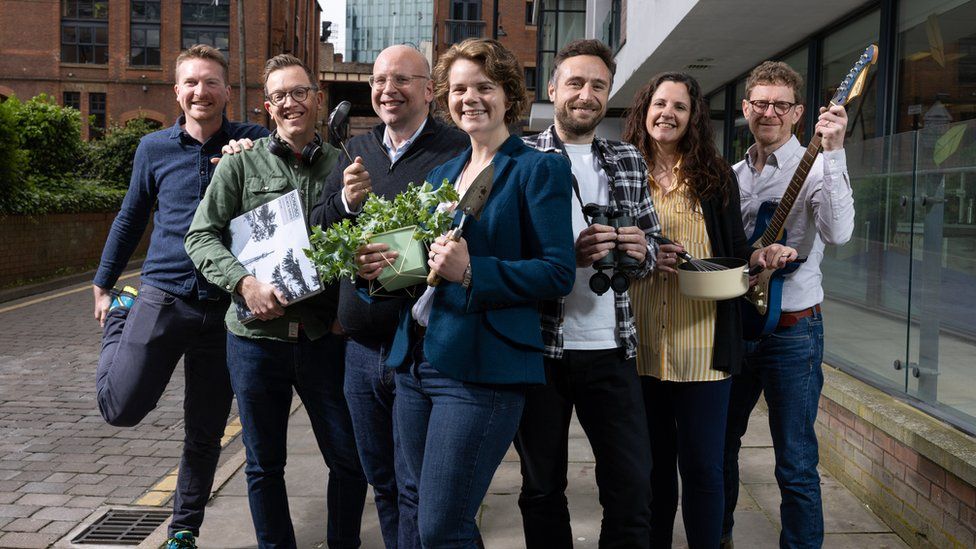ARTICLE AD BOX
 Image source, Tyler Grange
Image source, Tyler Grange
By Emma Simpson
Business correspondent, BBC News
When Joe Dance was offered the chance to earn his full salary by working just four days a week, he was sceptical.
"I thought, I'm so used to working five days. How are we going to deliver the same service for clients if we're not there?" the consultancy worker said.
But during a six-month trial where 3,000 people worked fewer hours for 100% pay, the new dad found his productivity improved.
The experiment ended today and the results will be shared next year.
The four-day week trial involving 70 UK companies kicked off on 6 June and is thought to be the world's biggest pilot scheme into the working pattern.
It's not about cramming five days' work into four. Instead workers are earning 100% of their salary for 80% of the hours they would normally do. The aim is to be more productive.
It has been organised by a group campaigning for a shorter working week but without any loss in wages.
Researchers from Oxford and Cambridge Universities and Boston College are overseeing the experiment along with the think tank Autonomy. The full results are not expected to be published until February next year.
But at the halfway point in September 86% of companies taking part said the four-day week was working well and they were likely to keep it.
Mr Dance said: "I've kind of eaten every single one of my words purely because, you know, it's actually made us better."
The 30-year-old from Stoke-on-Trent, works as an Ecology Associate for Tyler Grange, an environmental consultancy firm with six offices in England.
The 80 or so employees do not work on a Friday but still get paid 100% of their salary.
"It's forced us to be more pragmatic, more proactive and manage our time more effectively, in other words focusing on the most time critical work," Mr Dance said.
Image source, Tyler Grange
Image caption,Joe Dance uses some Fridays off to volunteer with a project that reintroduces water voles into the wild
He said he used his day off to spend time with his baby son as well as do some volunteering with a local programme helping to reintroduce water voles into the wild.
"It's not exactly restful, but it's wonderful. Having a newborn was part of the reason I decided to give it such a good go. Because once that time is gone, you don't get it back," he said.
Fridays are now "sacrosanct", and Joe said he would really struggle to go back to a five-day working week.
He is in luck as his employer has now decided to make the four-day week permanent.
"It's worked so well I'd be pretty crazy not to keep it," said managing director, Simon Ursell. "We're 101% productive in 80% of the time."
He added: "We look at an individual's productivity and as a consultancy we charge clients by the hour. So we've been measuring how much our staff are able to charge for their time...and it's been a fairly dramatic rise."
He said it meant unproductive meetings were quickly canned. "Everyone just wants to get on. If we'd been on a five day week, the meeting would've just carried on, because you fill the time you have."
What's more, Mr Ursell, has been measuring his team's wellness via an alertness app and said his employees are 18% less tired and 10% happier than before.
The business has also seen a more than five-fold increase in people enquiring about vacancies.
"My theory on this is that if you give someone a great reward or a really good incentive to do something, they're going to try really hard. And I can't think of a better incentive than time," he said.
Mr Ursell said many months of preparation before the pilot was key, as was the decision to effectively close the business for one day a week instead of having split rotas, a move which he acknowledges won't suit every business. He also lost two members of staff who didn't want to move to reduced hours.
Image source, 5 Squirrels
Image caption,Gary Conroy spends some of his days off learning to play the piano
Skincare business 5 Squirrels, based in Brighton, has also made the decision to work fewer hours.
"We're far, far, more productive," said Gary Conroy, founder and CEO
He has re-jigged their working day so there are periods when staff don't chat, answer calls or respond to emails - instead the 14 strong team get their "heads down" on focused work.
"It's had a major impact on the amount of stuff we can get done," says Gary.
Like Tyler Grange, they also don't work on a Friday and they ran a "pre-pilot" before making the big switch.
Sam Smith, co-founder of Pressure Drop brewery, is going to continue the four-day week trial for another year
At Pressure Drop Brewery in Tottenham, North London, not all workers are able to take the same day off as they have to keep the beer flowing and get the orders out.
It hasn't always been easy to manage but even so the benefits do outweigh the challenges, said co-founder, Sam Smith.
"We're happy with how it's gone. The main issue we've had is that we haven't really been able to stress test it properly in a full pelt environment...because the last six months haven't been great economically in terms of the environment," he said.
His staff have given it the thumbs-up. Office manager, Clare Doherty, says it's been "fantastic".
"I'm now expecting a baby so it means I've been able to schedule all my appointments on my day off. It's given me that extra little bit of space for planning and organising," she said.
The brewery is going to continue with the four-day week as a trial for another 12 months.
"We're anticipating a difficult year next year. And that, kind of, frankly, is occupying our thoughts and attention a lot more than the four day week is," said Mr Smith.
At the end of last month, the 4 Day Week Campaign Group separately announced that it had signed up more than 100 companies and organisations for a four-day week without cutting any workers' pay. The scheme launched at the beginning of 2021.
It's still a tiny percentage of workers, but they hope it's the start of a fundamental rethink in how we work. We'll find out early next year how many of the 70 companies taking part in the trial will make the switch, too.

 2 years ago
46
2 years ago
46








 English (US) ·
English (US) ·